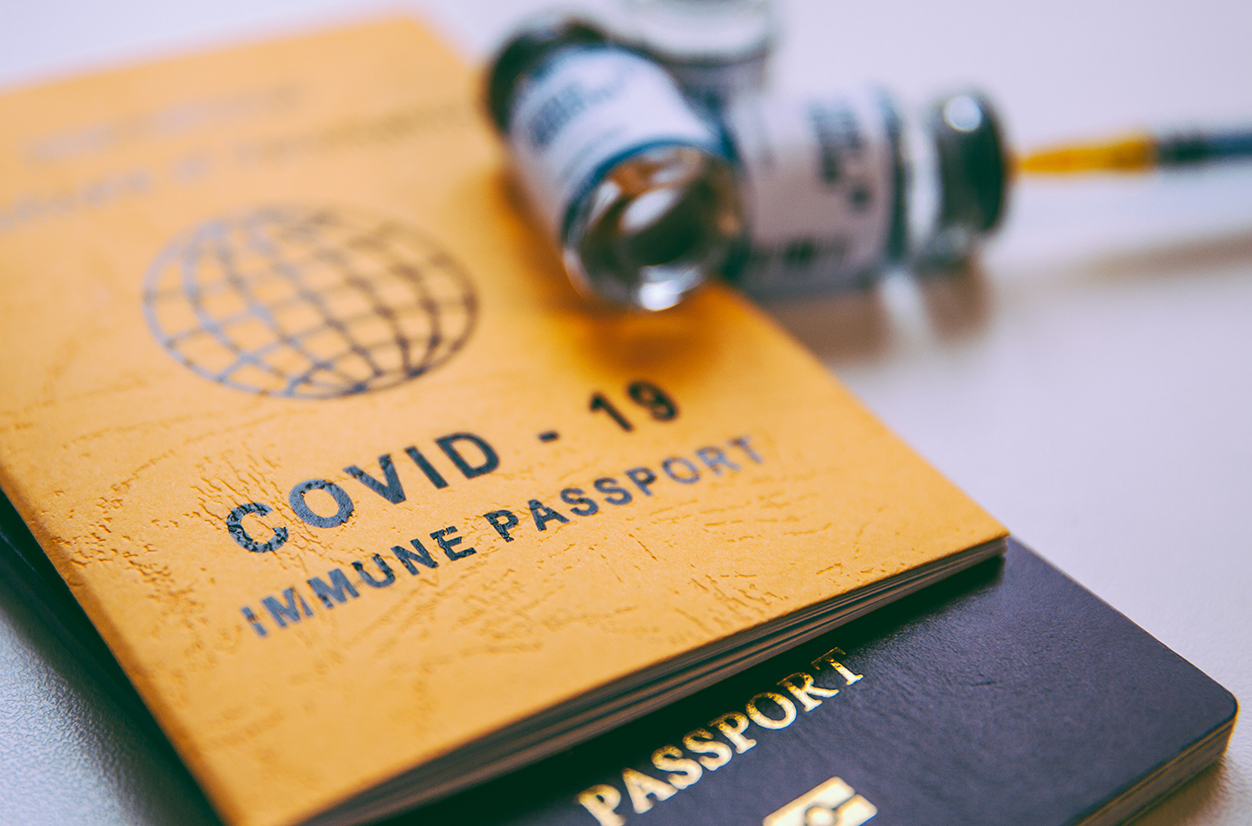Fly Me to the Moon: Vaccine Passports

The lunar landscape may seem like an appealing change of scenery after 14 long months of the COVID-19 pandemic. But whether you are embarking on a Space X rocket, Southwest jet, or the elevator of a place of business, are vaccine passports the new norm? Can businesses require them?
1. What is a vaccine passport?
A vaccine passport is proof that a person has been immunized against COVID-19. It could be in the form of a smartphone app or a written certificate.
The idea of a vaccine passport is not new. It was used in a similar sense over a hundred years ago with the plague and smallpox. Schools use a similar concept when requiring proof of students’ vaccination at the time of enrollment. However, as it relates to COVID-19, the topic of whether to have or require vaccine passports has been debated, discussed, has pros and cons, has ethical issues, and advantages and disadvantages. While the primary goal of a vaccine passport is to promote travel eligibility, some use of passports to regulate access to social and recreational gatherings, workplaces, or schools is already occurring.
The World Health Organization has established a “Smart Vaccination Certification” working group that will help create common standards for digital vaccination certificates — covering privacy, security, authentication and data exchange. This effort is not just for COVID-19 vaccines but other immunizations as well. And, later this month the Vaccination Credential Initiative, a coalition of health care and technology organizations, including IBM and Microsoft, plans to release “implementation guides” for verifiable vaccine credentials.
2. How are different countries and states addressing vaccine passports?
Different countries and states within the United States have addressed vaccine passports differently. Israel, with the world’s highest COVID-19 vaccination rate, has started a “green pass” to permit entry for vaccinated individuals, only, to sites such as hotels, gyms, restaurants, theaters, and music venues. Australia, Sweden and Denmark have also discussed implementing a passport system.
The federal and state response in the US has been less consistent. The Biden administration has represented that it will not institute a federally mandated vaccination credential system. On the state level, the ends of the ideological spectrum are once again represented by New York and Texas. In New York state, the “Excelsior Pass” permits attendance at theaters, arenas, event venues, and large weddings. In Texas, Governor Abbott has issued an Executive Order prohibiting state agencies or employers who receive state funding from requiring proof of vaccination as a condition of being allowed into the business or receiving service.
3. What are some ethical and legal considerations associated with vaccine passports?
Considerations about whether to implement a vaccine passport for your business—whether for employees or customers—should include a discussion about potentially discriminatory effects from the policy. Just like an employer, a business cannot discriminate against its customers based on medical disabilities. While giving sports teams, restaurants, and other businesses some flexibility in determining access may seem reasonable and even encourage an increase in business, safeguards need to be put in place to prevent unlawful discrimination.
Some of the ethical and legal considerations associated with vaccine passports are:
a. Even when the COVID 19 vaccine is more widely available in this country and around the world, rates among different socio-economic groups will be disparate which could lead to discrimination.
b. A passport system could essentially penalize people with religious or philosophical objections to getting vaccinated.
c. Proof of vaccination could also penalize people who just don’t want to get vaccinated.
d. Vaccination passports could penalize individuals who cannot get a COVID vaccination based on their medical conditions. These individuals would have to disclose their medical conditions in order to demonstrate why they cannot receive the vaccination and in general, this disclosure is prohibited by the Americans with Disabilities Act (ADA). The ADA, passed in 1990, says that an employer or a business cannot discriminate against people based on a disability. And if someone were not able to take the vaccine because they were immunocompromised or allergic to vaccine components or some other reason, they could argue that they were being discriminated against based on that disability.
There is no question that the decision of when and how to reopen a business, the physical workplace and venues with larger events is a difficult one, and one that should be made after careful planning and deliberation including whether to require vaccination for its employees and/or its customers. It is always a best practice to consult with a human resources manager and legal counsel regarding any employment-related issues and/or business customer issues. The attorneys in our Austin and Dallas offices are available to answer any questions you may have.
Legal Disclaimers
This blog is made available by Gerstle Snelson, LLP for educational purposes and to provide general information about the law, only. Neither this document nor the information contained in it is intended to constitute legal advice on any specific matter or of a general nature. Use of the blog does not create an attorney-client relationship with Gerstle Snelson, LLP where one does not already exist with the firm. This blog should not be used a substitute for competent legal advice from a licensed attorney.
©Gerstle Snelson, LLP 2021. All rights reserved. Any unauthorized reprint or use of this material is prohibited. No part of this blog may be reproduced or transmitted in any form or by any means, electronic or mechanical, including photocopying, recording, or by any information storage or retrieval system without the express written permission of Gerstle Snelson, LLP.

